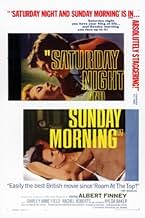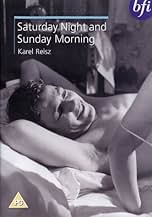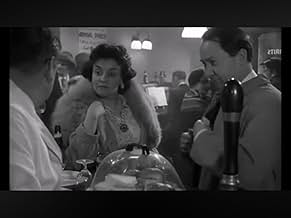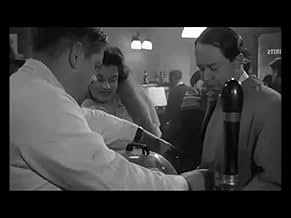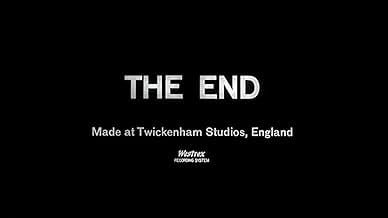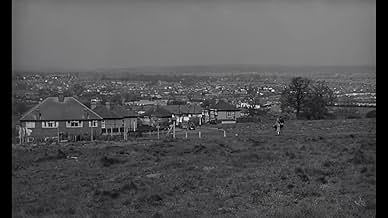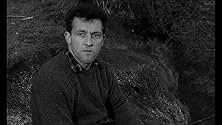Samedi soir, dimanche matin
- 1960
- Tous publics
- 1h 29min
Ajouter une intrigue dans votre langueA rebellious, hard-living factory worker juggles relationships with two women, one of whom is married to another man but pregnant with his child.A rebellious, hard-living factory worker juggles relationships with two women, one of whom is married to another man but pregnant with his child.A rebellious, hard-living factory worker juggles relationships with two women, one of whom is married to another man but pregnant with his child.
- Réalisation
- Scénario
- Casting principal
- Victoire aux 3 BAFTA Awards
- 10 victoires et 3 nominations au total
- Mrs. Seaton
- (as Elsie Wagstaffe)
- Loudmouth
- (as Colin Blakeley)
Avis à la une
In the theater, this revolt took the form of the "kitchen sink drama" and the era of the Angry Young Men In the movie industry, it was the era of "Free Cinema," an attempt by young filmmakers to break away from established subjects and standard treatments
This raw melodrama deals with Arthur Seaton (Finney), a working class young man who rejects the misery and grind of his home and factory, but whose only possible rebellion takes the form of a cynicism towards authority and a cheerful indulgence in sexual encounters with various ladies of the town His rebellion, though limited, is nevertheless genuine and the film's situation in a working class milieu is, for the habitually middle and upper class conscious British cinema, a much needed step forward...
The thing that deserves the most praise, however, is Sillitoe's script, which puts virtually all modern dramatic screenplays to shame. In a general way, the working class british films of the late 50s and 60s launched the tradition that leads to Loach, Leigh, Tim Roth, etc. This film's subtlety and ambivalence towards its leading character reminds me specifically of Mike Leigh at his very best.
It's hard work growing up, it always was, and it always will be.
This film was considered quite shocking at the time of its release because of its frank sexual situations and the freely-discussed topic of abortion. These themes aren't shocking anymore, but one reason for that is the introduction of them in films like this. Shot in black and white, it gives the viewer a picture of life in a bleak factory town, portrayed very realistically by director Karl Reisz. The actors are these people, they're not merely playing them. This is especially true of Finney, who sports a low-class accent and epitomizes the "angry young man" so prevalent in the late '50s. Finney's performance as a young man who takes out his work-week aggression on women, booze and mischief, is as revolutionary as Dean's or Brando's was in American cinema.
Finney is ably backed up by the supporting actors. Roberts is very effective as Brenda, a housewife married to a dull man, and Shirley Anne Field even dressed down is gorgeous as the ingénue who wins Arthur's heart and makes him look at the future. One wonders if he'll ever grow up sufficiently. She's going to have her hands full.
The dialect is very authentic and difficult to understand at times - I actually used my closed captioning. The dialect adds to the whole atmosphere of "Saturday Night and Sunday Morning," another of the rebel movies but in a class all by itself.
The fact that it shocked audiences and local authorities because of its themes covering sex and abortion show that this was a time when a great deal of change was taking place in British society. Although I wasn't around then, things must have been changing very rapidly as six years later 'Alfie' was able to confront these issues full on whereas Karel Reisz's film merely hints at them.
This film also established Albert Finney as a national star and he was soon to become an international star with the wonderfully bawdy 'Tom Jones'. Its always interesting to see the films that established the actors we admire and I'm certainly a fan of Albert Finney so I was shocked when I saw this film and felt that he wasn't really very good in it.
The opening scene where his character, Arthur Seaton, is counting the parts he is making in his factory seemed to introduce a highly overwrought man that shouted all the time. Thankfully the unnecessary 'anger' at the start was toned down later but I still felt at the end that Finney could have done greater justice to his role.
Walking around with a straight back and his chest out, talking twice as loud as he needs to seemed to resemble an angry old man rather than an angry young man and I almost expected him to talk about how kids nowadays didn't know they were born.
Its unusual that an actor from a working class background didn't convince me when playing a character that was not that dissimilar from himself whilst actors like Tom Courtenay in 'Loneliness...' and particularly Richard Harris in 'This Sporting Life' did it much better.
However, I gradually found myself being more and more absorbed in this film as it started to develop a storyline and move away from a young man being angry simply for the sake of it.
Rachel Roberts excels in her role as the married woman who becomes pregnant by Seaton and its a shame that this actress has been forgotten when you consider her performance here and the marvellous one she gave opposite Harris in 'This Sporting Life'.
Shirley Anne Field also does well as Doreen the girl looking to settle down and it is in her relationship with Seaton where I disagree with many people's assessment of the film.
Its generally said that Seaton hates the idea of conformity but in the end accepts it. However I feel that the film is much more hopeful than that as he realises that love and marriage is not necessarily a trap that only fools rush into and that there is much more to conventional life than he had originally anticipated.
Le saviez-vous
- AnecdotesThe factory scenes were filmed in the same factory that original author Alan Sillitoe worked in during the war when he was making shells and other artillery. At the time of filming, the factory was owned by the Raleigh bicycle company.
- GaffesWhen Arthur and Doreen meet for the first time, her packets of crisps on the counter disappear and reappear between shots.
- Citations
Arthur Seaton: Mam called me barmy when I told her I fell of a gasometer for a bet. But I'm not barmy, I'm a fighting pit prop that wants a pint of beer, that's me. But if any knowing bastard says that's me I'll tell them I'm a dynamite dealer waiting to blow the factory to kingdom come. I'm me and nobody else. Whatever people say I am, that's what I'm not because they don't know a bloody thing about me! God knows what I am.
- ConnexionsFeatured in Viewpoint: We the Violent: Part 1 (1961)
Meilleurs choix
- How long is Saturday Night and Sunday Morning?Alimenté par Alexa
Détails
- Date de sortie
- Pays d’origine
- Langue
- Aussi connu sous le nom de
- Todo comienza el sabado
- Lieux de tournage
- Société de production
- Voir plus de crédits d'entreprise sur IMDbPro
Box-office
- Budget
- 100 000 £GB (estimé)
- Montant brut mondial
- 370 $US
- Durée1 heure 29 minutes
- Couleur
- Rapport de forme
- 1.66 : 1


